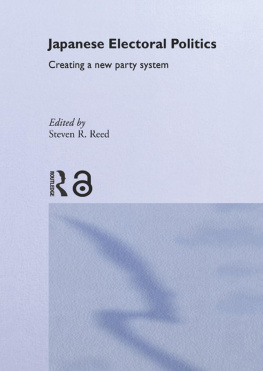The Nissan Institute/RoutledgeCurzon Japanese Studies Series
Editorial Board
J.A.A. Stockwin, Nissan professor of modern Japanese studies, University of Oxford and director, Nissan Institute of Japanese Studies; Teigo Yoshida, formerly professor of the University of Tokyo; Frank Langdon, professor, Institute of International Relations, University of British Columbia; Alan Rix, executivedean, faculty of arts, The University of Queensland; Junji Banno, formerly professor of the University of Tokyo, now professor, Chiba University; Leonard Schoppa, associate professor, department of government and foreign affairs, and director of the East Asia Center, University of Virginia.
Other titles in the series:
The Myth of Japanese Uniqueness
Peter Dale
The Emperor's Adviser: Saionji Kinmochi and Pre-war Japanese Politics
Lesley Connors
A History of Japanese Economic Thought
Tessa Morris-Suzuki
The Establishment of the Japanese Constitutional System
Junji Banno, translated by J. A. A. Stockwin
Industrial Relations in Japan: The Peripheral Workforce
Norma Chalmers
Banking Policy in Japan: American Efforts at Reform During the Occupation
William M. Tsutsui
Educational Reform in Japan
Leonard Schoppa
How the Japanese Learn to Work: Second Edition
Ronald P. Dore and Mari Sako
Japanese Economic Development: Theory and Practice, Second Edition
Penelope Francks
Japan and Protection: The Growth of Protectionist Sentiment and the Japanese response
Syed Javed Maswood
The Soil, by Nagatsuka Takashi: A Portrait of Rural Life in Meiji Japan
Translated and with an introduction by Ann Waswo
Biotechnology in Japan
Malcolm Brock
Britain's Educational Reform: A Comparison with Japan
Michael Howarth
Language and the Modern State: The Reform of Written Japanese
Nanette Twine
Industrial Harmony in Modem Japan: The Intervention of a Tradition
W. Dean Kinzley
Japanese Science Fiction: A View of a Changing Society
Robert Matthew
The Japanese Numbers Game: The Use and Understanding of Numbers in Modem Japan
Thomas Crump
Ideology and Practice in Modem Japan
Edited by Roger Goodman and Kirsten Refsing
Technology and Industrial Development in Pre-war Japan: Mitsubishi Nagasaki Shipyard, 18841934
Yukiko Fukasaku
Japan's Early Parliaments, 18901905: Structure, Issues and Trends
Andrew Fraser, R. H. P. Mason and Philip Mitchell
Japan's Foreign Aid Challenge: Policy Reform and Aid Leadership
Alan Rix
Emperor Hirohito and Shwa Japan: A Political Biography
Stephen S. Large
Japan: Beyond the End of History
David Williams
Ceremony and Ritual in Japan: Religious Practices in an Industrialized Society
Edited by Jan van Bremen and D. P. Martinez
Understanding Japanese Society: Second Edition
Joy Hendry
The Fantastic in Modem Japanese Literature: The Subversion of Modernity
Susan J. Napier
Militarization and Demilitarization in Contemporary Japan
Glenn D. Hook
Growing a Japanese Science City: Communication in Scientific Research
James W. Dearing
Architecture and Authority in Japan
William H. Coaldrake
Women's Giday and the Japanese Theatre Tradition
A. Kimi Coaldrake
Democracy in Post-war Japan: Maruyama Masao and the Search for Autonomy
Rikki Kersten
Treacherous Women of Imperial Japan: Patriarchal Fictions, Patricidal Fantasies
Hlne Bowen Raddeker
JapanesGerman Business Relations: Competition and Rivalry in the Inter-war Period
Akira Kud
Japan, Race and Equality: The Racial Equality Proposal of 1919
Naoko Shimazu
The Making of Urban Japan: Cities and Planning from Edo to the Twenty-first Century
Andre Sorensen
Public Policy and Economic Competition in Japan: Change and Continuity in Antimonopoly Policy, 19731995
Michael L. Beeman
Modem Japan: A Social and Political History
Elise K. Tipton
Men and Masculinities in Contemporary Japan: Dislocating the Salaryman Doxa
Edited by James E. Roberson and Nobue Suzuki
The Voluntary and Non-profit Sector in Japan: The Challenge of Change
Edited by Stephen P. Osborne
Japan's Security Relations with China: From Balancing to Bandwagoning
Reinhard Drifte
Understanding Japanese Society: Third Edition
Joy Hendry
Japanese Electoral Politics: Creating a New Party System
Edited by Steven R. Reed
First published 2003 by Routledge
Published 2017 by Routledge
2 Park Square, Milton Park, Abingdon, Oxon OX14 4RN
711 Third Avenue, New York, NY 10017, USA
Routledge is an imprint of the Taylor & Francis Group, an informa business
Copyright 2003 Steven R. Reed for selection and editorial material; individual contributors their contributions
Typeset in Times by
Rosemount Typing Services, Thornhill, DG3 5LS
The Open Access version of this book, available at www.tandfebooks.com, has been made available under a Creative Commons Attribution-Non Commercial-No Derivatives 4.0 license.
British Library Cataloguing in Publication Data
A catalogue record for this book is available from the British Library
Library of Congress Cataloging in Publication Data
Japanese electoral politics : creating a new party system / edited by Steven R. Reed.
p. cm.
Includes bibliographical references and index.












